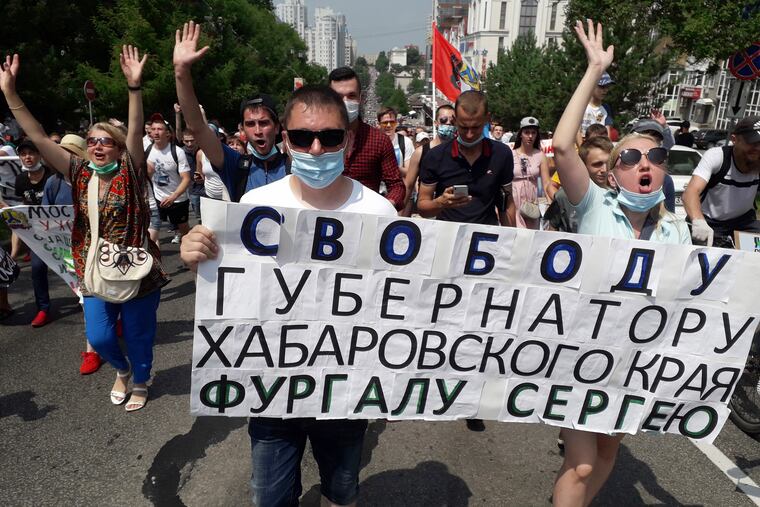Putin, facing resistance, needs a Trump win more than ever | Trudy Rubin
A Trump win would kill NATO, undermine Western democracies, and help the Kremlin distract from protests at home.

Four thousand miles west of Portland, Ore., clear across the Pacific Ocean, there are other political demonstrations that deserve our attention.
In Russia’s far eastern city of Khabarovsk, near the Chinese border, tens of thousands of angry Russians have turned out for three weeks to protest the arrest of a popular young governor. Sergei Furgal was pulled from his car, bundled off to Moscow, and accused of 15-year-old murders, but his real crime was to challenge Vladimir Putin by defeating a Kremlin ally in elections.
What makes these demonstrations so stunning is that Putin has crushed similar protests in far off Moscow, and elsewhere. The Kremlin has also been cracking down on free press remnants and political activists since Putin orchestrated a July 1 referendum that permits him to remain president for his lifetime.
Yet, serious economic problems, including low oil prices and the ravages of COVID-19 — along with gross Kremlin corruption — are eating away at Putin’s legitimacy. The Kremlin was apparently taken by surprise by the outpouring of public fury in Khabarovsk and hasn’t yet decided what to do.
» READ MORE: By sending feds to Portland for political gain, Trump follows autocrats' playbook | Trudy Rubin
Khabarovsk is a bracing reminder that weakened at home, Putin will be even more eager to prove that Russia is still a global great power. That gives him a strong incentive to try again to interfere in a U.S. presidential election in favor of his fervent admirer, Donald Trump.
Watching clips of the demonstrations, it is easy to feel the rage of Russians at Putin’s billionaire circle while many medical facilities lack running water or heating and small businesses are ripped off by officials.
Khabarovsk banners read: “We hate Moscow”; “Putin resign!”; “They have stolen our Governor”; and “Go away from our river, our minerals, our resources.” The BBC reports that, according to the latest Levada poll, 83% of Russians know about the protests, and 45% view them positively, even though state-controlled TV has ignored them.
If you want to grasp how post-Soviet Russia was overtaken by thugs, read Putin’s People: How the KGB Took Back Russia and Then Took On the West by investigative journalist Catherine Belton. It traces how Putin and a small group of KGB agents, many from his hometown of St. Petersburg, took control of the country’s natural resources and extended tentacles into the United States and Europe.
Reading the book cast me back to a day in November 1998, when I stood by the stairs in a St. Petersburg apartment building, on a landing strewn with flowers in tribute to Galina Starovoitova. A human rights activist and parliament member whom I knew well, she had been gunned down right there a couple of days prior, apparently because of her crusade against corruption in the oil industry. Putin, then head of Russia’s main intelligence agency and soon to become president, could surely have learned who ordered the hit job, but the murderer was never identified.
At Galina’s graveside, in the frigid cold, an endless procession of mourners filed by, piling notes and flowers on the site, as many cried silently. Those tears were the prelude to the two decades of rapacious Putin thuggery that has led to Khabarovsk.
So one must give full credit to the courage of the demonstrators — and Gov. Furgal. Although Putin’s popularity is at its lowest since he took power, it still stands at 59%, perhaps because Russians see no alternative, perhaps because they fear pollsters. The people of Khabarovsk know the dangers of challenging Putin and the slim odds of moving the Kremlin, yet they still turn out.
» READ MORE: ‘Absolutely, this harms Ukraine’: Prominent NGO official in Kiev talks about Trump shakedown | Trudy Rubin
But the Kremlin kidnapping of Furgal is a reminder of Putin’s methodology — and of the importance of the 2020 election to the Russian leader. He has made clear his determination to expand Russian influence in Europe, with political and military provocations. He openly seeks to undermine NATO and to weaken the European Union.
Trump has helped Putin in the past — denigrating the EU and NATO, and threatening to quit the security alliance while inviting Putin back to G-7 talks over European objections. Should Trump be reelected, many European officials assume he would exit NATO. “If Trump wins, it is not a matter of if, but when NATO goes away,” I was told by U.S. Rep. Brendan Boyle (D., Pa.), a member of the U.S. delegation to the NATO Parliamentary Assembly. Boyle says this is the firm belief of pro-American officials across the ideological spectrum in Europe.
So Putin has every incentive to intervene again in the 2020 election.
“They don’t need to do much, just to take advantage of our volatility,” says Fiona Hill, the former national security expert on Russia who testified at the Trump impeachment hearings. “If they think Biden is going to win, they will try to weaken him. If the election is tight, something small might have more consequences.”
Khabarovsk should serve as a warning that an autocrat wounded at home may strike out elsewhere. Think of Galina. Pray for the demonstrators. And beware.